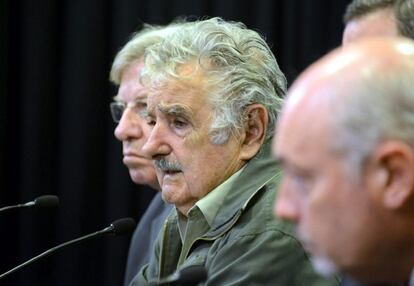Uruguay’s Mujica to ask Obama for help in legal battle with Philip Morris
Tobacco giant claims government violating copyright laws by ordering changes to cigarette packets

During his first White House visit next month, Uruguayan President José Mujica is expected to ask President Barack Obama for his help in what is predicted to be a long, drawn-out legal battle between his country and Philip Morris over anti-tobacco legislation.
Philip Morris, which owns the Marlboro and L&M brands, successfully convinced arbitrators at the International Center for Settlement of Investment Disputes (ICSID) to accept its arguments that the Uruguayan government has violated the terms of a 1988 bilateral investment treaty it signed with Switzerland.
Philip Morris has its main headquarters in Lausanne.
In 2009, the Uruguayan government passed a law that obliges cigarette manufacturers to post graphic images on packages that depict the ill effects of smoking on a person’s health. The law also required that cigarette brands have a single image, and “prohibits different packaging or presentations for cigarettes sold” for sub-brands, such as Marlboro Gold, Marlboro Red or Marlboro Blue.
In unprecedented arguments, Philip Morris lawyers claimed that the country’s anti-tobacco law violates the company’s intellectual rights because the packages and trademarks must be altered to comply with the law. They also claimed that the company has lost millions by reducing the number of sub-brands in the Uruguayan market.
On July 2, 2013, a three-member arbitration panel sided with Philip Morris and ruled that the ICSID had jurisdiction over the tobacco giant’s claims because they may breach the 1988 bilateral promotion and protection of investments treaty signed between Uruguay and Switzerland.
Ex-President Vázquez warned that the company was using Uruguay as “a test case” to scare other nations
Former President Tabaré Vázquez, a cancer expert and sponsor of the legislation, had warned in 2010 that Philip Morris would “not hold back on spending to obtain its objectives.”
Vázquez, who is running again for president, complained that the company was using Uruguay as “a test case” to scare other nations off from passing similar anti-tobacco legislation.
If the ICSID rules against Uruguay, it could have as much as a $2-billion impact on the tiny nation’s economy. The government in Montevideo estimates that the legal battle will continue for another three years at the current rate and has decided to change its strategy by trying to initiate an international pressure group with US support.
On Tuesday, the Uruguayan Foreign Ministry and US State Department Officials agreed to put the issue on the agenda when Mujica is scheduled to meet with Obama on May 12 in Washington.
Uruguay already has the support of the Swiss government, World Health Organization and scores of NGOs, including many from the United States.
Uruguay government officials said their main purpose is to protect the health of its citizens. According to official figures, smoking has declined in Uruguay by 10 percent over the past five years. Still, about 13 people die each day in Uruguay from smoking-related deaths.
Tu suscripción se está usando en otro dispositivo
¿Quieres añadir otro usuario a tu suscripción?
Si continúas leyendo en este dispositivo, no se podrá leer en el otro.
FlechaTu suscripción se está usando en otro dispositivo y solo puedes acceder a EL PAÍS desde un dispositivo a la vez.
Si quieres compartir tu cuenta, cambia tu suscripción a la modalidad Premium, así podrás añadir otro usuario. Cada uno accederá con su propia cuenta de email, lo que os permitirá personalizar vuestra experiencia en EL PAÍS.
¿Tienes una suscripción de empresa? Accede aquí para contratar más cuentas.
En el caso de no saber quién está usando tu cuenta, te recomendamos cambiar tu contraseña aquí.
Si decides continuar compartiendo tu cuenta, este mensaje se mostrará en tu dispositivo y en el de la otra persona que está usando tu cuenta de forma indefinida, afectando a tu experiencia de lectura. Puedes consultar aquí los términos y condiciones de la suscripción digital.








































